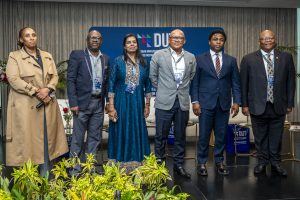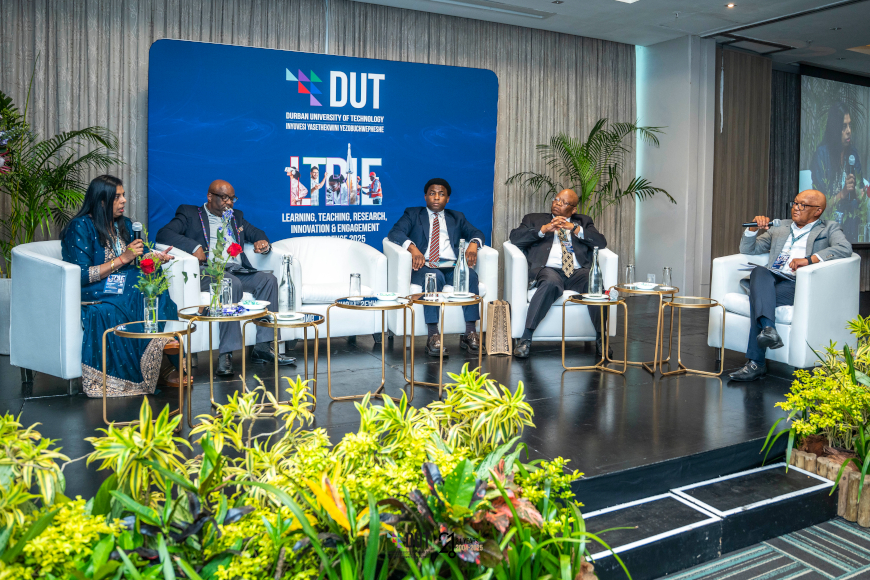Day two of the Learning, Teaching, Research, Innovation and Engagement (LTRIE) Conference kicked off with a distinguished lineup of keynote speakers, lead talk presenters, robust panel discussions and thought-provoking paper presentations at the Coastlands Umhlanga today, 28th October 2025.
Programme Director, Dr Nomcebo Mthombeni, Interim Director: Research and Postgraduate Support at the Durban University of Technology (DUT) shared her introductory remarks, recommending a dire need to create a space that facilitates learning and engaged learning for students, enabling them to be creative and to teach the DUT community what they have learned.
“We need to reimagine our role as universities for a better society. Particularly with some of the keynote speakers we have listened to at the LTRIE Conference where we were sensitised to saying we need to rethink or deconstruct how we are thinking about allowing or facilitating learning for our students,” she said.
Dr Mthombeni then moved into the topic of discussion for the panel discussion on reframing student success where each panellist gave their take on how it should be envisioned at universities.
Lead panellist was Professor Norman Duncan, other panellists included Deputy Vice Chancellor: Research, Innovation and Engagement, Professor Fulufhelo Nemavhola, DUT’s registrar, Dr Maditsane Nkonoane, Dean of Students at DUT, Dr Clement Moreku and Acting Director: Centre for Excellence in Learning and Teaching (CELT), Dr Shoba Rathilal.
Prof Duncan, who is DUT’s Siyaphumelela coach, posed the question to the panellists on what does a reframed or re-imagined successful student outcome looks like in the context of DUT’s ENVISION2030 strategy, and its vision statement?
Prof Nemavhola gave his insight saying that the research that DUT is doing or ought to be doing should be directly linked to society. “There must be a mirror of what we do as researchers and society and unfortunately in most cases what we have been observing is that the research that we publish may not necessarily reflect the practicality or the real situation on the ground,” he said.
He further spoke on making sure that students, whether they are postgraduate students or undergraduate students, that when they leave DUT they are able to do whatever is necessary for their own survival.
“I think that’s it’s very important for students to be able to leave DUT and to be able to start their own enterprise, whether in the communities that they come from or whether they are starting professional businesses or enterprises,” he said. Adding to the conversation, Dr Nkonoane expressed his reflections, acknowledging the fact that the idea of student success has evolved or continues to evolve.
“It is incumbent on upon the university like DUT to also begin to reimagine and to reframe what we conceive of student success and the vehicle through which we are able to navigate the complex terrain of student success is ENVISION2030, starting with the four perspectives. Of ENVISION2030, particularly stewardship, which prescribes what our role should be in the student life cycle, and now the student life cycle starts. Once the student makes contact with DUT by way of an inquiry to apply and then we start the enrolment process but once the student is registered or even shortly before then, it is also incumbent upon those who want to provide that guarantee of success to this prospective student. The applicant needs to also set activities in motion and a seminal activity in this in an attempt to provide a guarantee, an assurance towards success which will be your first year orientation,” he explained.
He indicated it is only then that one can unpack what the university is about, but also provide guarantee that between one’s day one and the last day when a registrar would hood one off the stage, one is guaranteed of success with interventions.
Panellist leader, Prof Duncan then posed the question on how does one differentiate between equity of access and equity of success, and why can this distinction be considered as one of the more critical, ethical and strategic issues that the university should address?
DUT’s Dr Moreku shared that from the student services the question of equity of access has got to do with ensuring that students are assisted or supported holistically, especially from where they are coming from, with whatever they are coming with. “What we usually do is to ensure that through the biographical information or data we are able to know the strengths and the weaknesses of the students and that allows us to come up with the needs peculiar to the cohort of students,” he emphasised.
Outlining her point on the equity of access, Dr Rathilal indicated that the issue of equity of access, is not about equalness, it’s about providing the opportunities for students to be able to reach their full potential or their aspirations,” she said.
In terms of how to go about measuring student success, Dr Rathilal further added on DUT’s ENVISION2030 strategy.
“Our philosophy of education statement, which says our creativity and innovation shapes adaptive graduates who transform society. So just in that statement, it suggests that when we are assessing success, we need to look at whether we are able to assess adaptability and whether we are able to assess whether what we are doing has the impact it needs to have and it is impacting on society itself,” she said.
Going forward, Prof Nemavhola explained that a number of things need to be done in order for students to be more innovative and to be able to plug in societies that they come from.
“We need to work together in ensuring that we provide an ecosystem that will allow students to learn,” he said.
 Another pivotal question posed was on the demanding academic environment which can increase student stress and anxiety, and in recent years, this was seen to have adversely affected students’ academic performance. Dr Moreku indicated that as the student services, they have an array of initiatives dealing with the psycho-social challenges of the students.
Another pivotal question posed was on the demanding academic environment which can increase student stress and anxiety, and in recent years, this was seen to have adversely affected students’ academic performance. Dr Moreku indicated that as the student services, they have an array of initiatives dealing with the psycho-social challenges of the students.
“Our students make use of counselling services which are both in person and also online, but also we are moving towards having more social workers for instance to assist our students,” he shared.
Prof Duncan gave an account of recent student pass rate statistics, where he relayed that a student has a greater chance of not succeeding than succeeding. His final question to the panellists was what they were hoping to achieve in the next five years until 2030 to ensure greater levels of student success in the system.
Dr Moreku summed it up by saying that the core curriculum and extra curriculum needed to be enhanced. “We are trying to holistically develop our students so that they become resilient.
“We will be enhancing our initiatives and ensure that we have tracking tools which are impactful with different metrics to ensure that whatever initiative we embark on, it’s impactful towards student success,” he expressed.
Prof Duncan thanked the panellists for their impactful contributions and for a highly instructive discussion.
The conference continued with an insightful presentation by Prof Duncan on the role of distributed leadership in improving student success.
“In contexts such as South Africa, student success in the higher education system is an important and necessary priority. The reasons for this are uncomplicated, firstly, there’s a strong relationship between the proportion of the country’s population that has qualifications from institutions of higher learning and the development potential of that country. Compared to many other countries, South Africa has a very low high education participation rate, hence the need to significantly improve our low student success rates,” he added.
Furthermore, Prof Duncan indicated that higher education is costly and many students from disadvantaged backgrounds simply cannot afford to repeat even one year of study. “A significant proportion of our students come from under-resourced and underserved communities. In South Africa, as is the case in many other similar contexts, obtaining a qualification from an institution of higher learning is viewed as one of the shortest roots out of poverty. This is indeed borne out by a research that consistently shows that a tertiary education qualification is one of the strongest predictors of employability in contexts such as South Africa,” he shared.
He emphasised that academic success is important not only for obtaining employment, but also for job creation and self-actualisation. Prof Duncan then delved into the traditional definition of student success, speaking about DUT’s vision of student success.
Day two concluded with exhilarating paper presentations on fostering innovation and graduate adaptiveness with a highlight presentation delivered by Patience Mutsvairigwa and Obed Chauke. Their topic of discussion was titled: Inculcating an entrepreneurial mindset through an entrepreneurship module: facilitator reflections on the Entrepreneurial Edge module at a University of Technology.
Mutsvairigwa presented a case study of DUT’s Entrepreneurial Edge module, which seeks to cultivate entrepreneurial thinking among undergraduate students. According to Mutsvairigwa, the findings suggest that the true value of entrepreneurship education lies not only in student outcomes but also in the development of reflective, entrepreneurial educators capable of adapting to complex educational landscapes.
“Quality entrepreneurship education is co-constructed through relational, reflective, and resourceful teaching, an approach that empowers both students and facilitators to embody the entrepreneurial spirit in learning and practice.Entrepreneurship modules in universities are effective in cultivating an entrepreneurial mindset, especially when they combine experiential learning, exposure to role models, and supportive institutional climates. These elements not only enhance students’ skills and attitudes but also increases their intention and readiness to pursue entrepreneurial careers,” she said.
Her final thoughts were that entrepreneurship modules in universities can become pathways to an entrepreneurial mindset among university students. Day three has the much-anticipated keynote speaker, Professor Puleng LenkaBula, Principal and Vice-Chancellor of UNISA, sharing her insights on propelling universities as sites of transformation and societal change.
Pictured: Panellists at the panel discussion on reframing student success where each panellist gave their take on how it should be envisioned at universities.
Waheeda Peters

